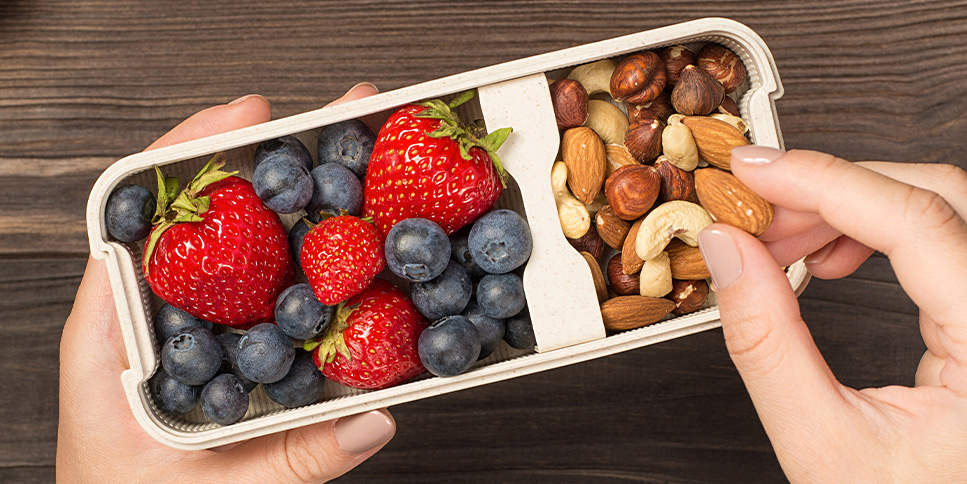Reaching a new chapter of life is exciting, but it also comes with a new round of physical and mental changes to contend with. Losing weight is rarely easy, but maintaining effective weight loss in your forties can be even more challenging.
How Your Body Changes in Your Forties
Your forties brings new priorities and routines, and you could find yourself less active or struggling with healthy eating more than before. You could see decreased muscle mass, menopause symptoms, or even a different body shape from what you’re used to.
While you can take steps for preventing weight gain or building strength and endurance, many changes come down to the natural aging process:
Slowed Metabolism
Metabolic speed is the driving factor for burning calories and causing weight loss. Though individual metabolism depends on activity level and health conditions, age-related muscle loss slows metabolism during your forties. As your body ages, you don’t burn as much energy while resting.
That doesn’t mean you’re fighting a losing battle against metabolic speed. In fact, recent research suggests there’s a strong connection between age-related metabolism changes and behavior.
Slowed metabolism creates changing nutritional needs, including a need for fewer calories and more calcium. The better you fuel your body, the easier it is to reach a healthy weight.
Decreased Muscle Mass
Much of your changing body shape comes from decreased muscle mass. Women lose muscle mass twice as fast as men by age forty, leading to a half pound or more of muscle loss annually. The core and abdomen are particularly prone to muscle loss, creating the appearance of more belly fat.
Men lose roughly 30 percent of their muscle mass over their entire lives, averaging about 3 to 5 percent lost each decade. Decreased muscle mass leads to increased health risks for falls, fractures, and mobility limitations.
Staying active with strength training exercises can combat the effects of muscle loss.
Changing Hormones
Many women experience menopausal symptoms in their forties as estrogen and thyroid levels change. The result is increased insulin and more cravings and hunger pangs. These changes make it harder to lose weight and burn calories.
Men also undergo hormonal changes. Testosterone production declines about 1 percent each year after forty, though it’s rare for men to reach a truly “low” testosterone level.
Medical Conditions
While medical professionals agree that most forty-year-olds are healthy and vibrant, this era of life does make you more prone to certain medical conditions, such as osteoarthritis, kidney stones, gum or heart disease, stroke, and symptoms of sexual dysfunction.
While you can’t prevent all health risks entirely, you can take steps to reduce your risk of serious illness.
Lifestyle Changes in Your Forties That Contribute to Weight Gain
According to the Centers for Disease Control, obesity is nearly 45 percent more prevalent for adults in their forties and fifties. While some weight gain likely stems from metabolism changes, it also comes from unhealthy eating habits like overeating, excessive snacking, and overindulging in junk food.
Lack of physical activity also makes it harder to maintain a healthy weight, and that’s only worsened by an overall lack of energy caused by increased responsibilities, poor sleep quality, existing health conditions, and stress.
There’s a direct link between a lack of exercise and living with obesity. Because your metabolism doesn’t burn calories as fast as it used to, sticking to the same eating habits you’ve always enjoyed without incorporating new exercise almost guarantees weight gain.
Ways to Lose Weight in Your Forties

The good news is that losing as little as 5 percent of your body weight can significantly improve your health, even if you start your weight loss journey later in life.
Losing weight in your forties isn’t without challenges. Follow these tips as you adjust to your body’s new processes:
1. Ignore Common Weight Loss Myths
Weight loss myths like “fat-burning” foods or supplements promising overnight results are rarely backed by science. Other dieting myths and trends, like crash dieting or eliminating entire food groups, do more harm than good.
Fuel your body with delicious healthy food, consume fewer calories, and don’t feel guilty for snacking and indulgences. Just offset your calorie intake with cardio or strength training to meet your weight loss goals.
2. Meet Your New Metabolism Needs
Your new metabolism needs increased fiber to keep you full. You can also boost your metabolism by prioritizing sleep, engaging in high-intensity training, drinking green tea, or enjoying spicy foods.
You might also consider implementing an all-new approach to nutrition. For example, the Mediterranean-style eating pattern includes fresh produce, fish, and whole grains with minimal dairy—studies show it can positively impact your health.
You could also lower sodium intake to alleviate high blood pressure, reduce the risk of diabetes and heart disease, and lose more weight.
3. Be Intentional about Physical Activity
Exercise may help prevent age-related decline in muscle function. Studies show that adults forty and older who take at least eight thousand daily steps have a 51 percent lower risk of death than those with four thousand daily steps.
Some specific exercises to try for weight loss include circuit training, weight training, bicycling, yoga, and endurance-building routines.
Making Dietary and Lifestyle Changes in Your Forties

Follow these tips for healthy aging in your forties:
- Set achievable goals: Be realistic when setting weight loss goals in your forties. Your body is changing, and your lifestyle may not accommodate big changes overnight.
- Don’t forget your vitamins: Supplement a healthy diet with supplements like vitamin D.
- Get plenty of protein: Protein is one of the most important foods to add to your diet. It keeps you full and gives you energy to stay active. Top protein sources include eggs, nuts, chicken, fish, lean beef, yogurt, and cheese.
Meet Your Weight Loss Goals
Effective weight loss in your forties is possible—visit Hydroxycut to get the products you need to feel your best.
*The links used in this article are being provided as a convenience and for informational purposes only; they do not constitute an endorsement or an approval by Iovate Health Sciences International Inc. or any of its affiliates (“Iovate”) of any of the products, services or opinions of the corporation or organization or individual. Iovate bears no responsibility for the accuracy, legality or content of the external site or for that of subsequent links. Contact the external site for answers to questions regarding its content.







